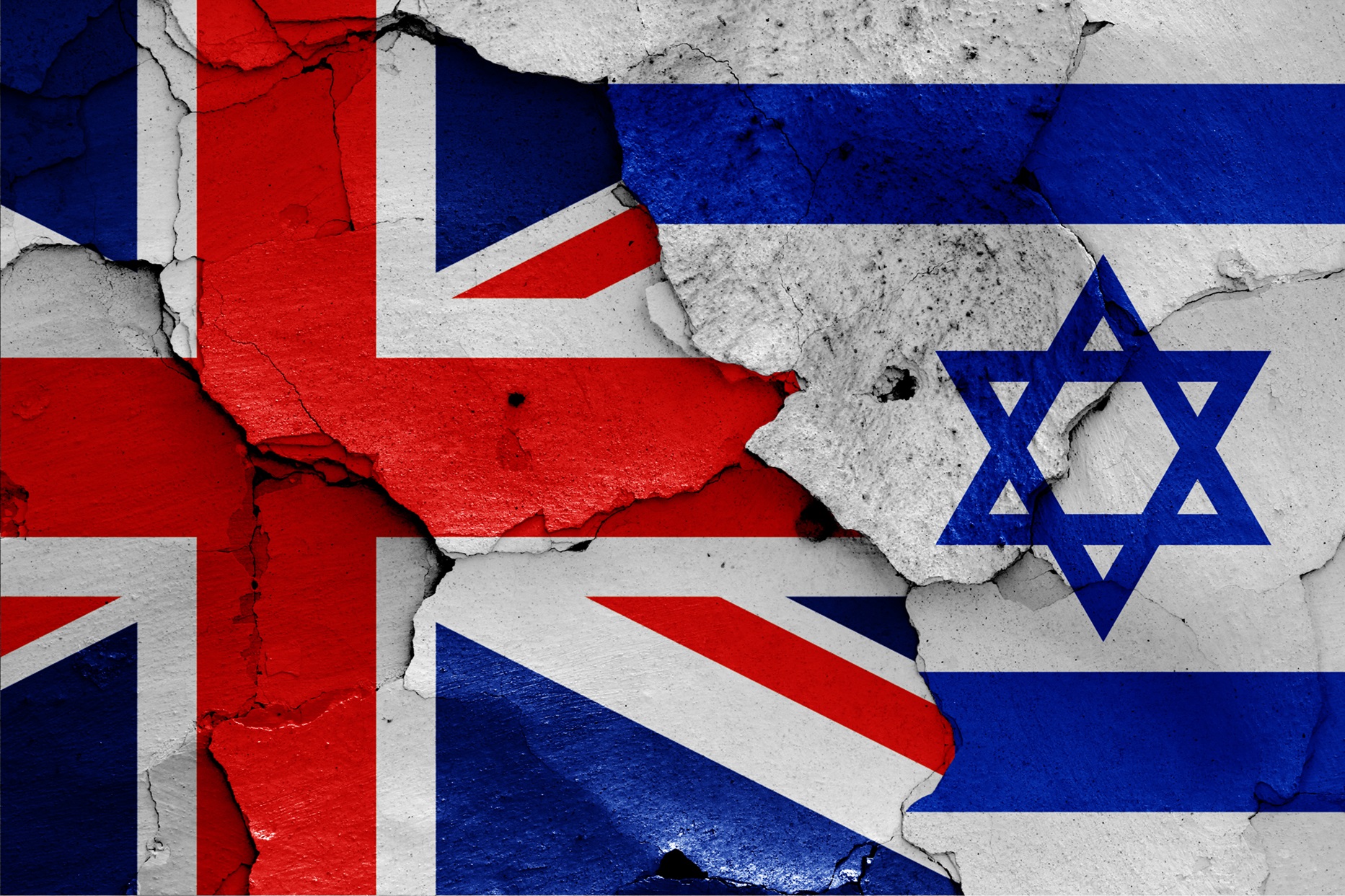Publications
INSS Insight, No. 1857, May 21, 2024
For many years, Britain has been one of Israel’s strongest allies in Europe. In the wake of the October 7 attacks, the Conservative government expressed a strong understanding for Israel’s right to use force against Hamas in Gaza, while Britain also participated in the successful efforts to intercept the Iranian drone and missile attack of April 13. Yet Britain has expressed growing consternation and dismay over Israel’s conduct of the war and its apparent lack of cooperation in allowing humanitarian aid into Gaza and has been considering the possibility of imposing a ban on arms sales to Israel. Although such a ban would have only symbolic value, it would clearly signify British disapproval of Israel’s actions. Israel will need to carefully consider its response if the British government takes this measure, given the potential damage to relations with one of its closest allies in Europe.
Up until the attacks of October 7, Israel’s relations with Britain had prospered in spite of the lack of any progress toward a resolution of the Israeli–Palestinian conflict. Britain’s decision to leave the European Union in June 2016 was seen in Israel as an opportunity to promote trade with London. Britain is now one of Israel’s biggest export markets after the United States, having established a Trade and Partnership Agreement (TPA) with Israel in January 2021, followed by the signing of a new memorandum of understanding to develop cooperation in a number of areas such as cyber, technology, trade, and defense. These robust trade ties and the growing bilateral security cooperation were an expression of the strong bilateral relationship.
After October 7, Prime Minister Rishi Sunak expressed “unequivocal” UK support for Israel “not just today, not just tomorrow, but always.” This was backed up by the British dispatch of military assets to the Eastern Mediterranean to support Israel and bolster regional security. The British leader visited Israel on October 19 to express his solidarity with the Israeli people. More recently on April 13, British Royal Air Force Typhoons participated in the successful interception of the Iranian drone and missile attack on Israel.
However, amid the growing number of Palestinians that have been killed and the increasingly acute humanitarian situation in Gaza, the British public mood has turned against Israel. Even when relations between the Israeli and British governments have been strong, many Israelis have been wary of British public attitudes. In 2010, the late Shimon Peres suggested in an interview that Britain’s establishment was “deeply pro-Arab . . . and anti-Israeli.” A few years later, Israelis were alerted to the animosity toward Israel shown by public figures such as Jeremy Corbyn, the leader of the Labour Party between 2015 and 2020. In Britain itself, antisemitism was widely seen as an endemic problem within the Labour Party under Corbyn. Israel’s prime minister, Benjamin Netanyahu, had fiercely condemned Corbyn in 2018 for attending a memorial ceremony honoring the terrorists behind the 1972 Munich Olympics massacre.
There has been a significant rise in cases of antisemitism in Britain since the October 7 attack, causing British Jews to feel increasingly vulnerable. The Community Security Trust (CST), which records the numbers of antisemitic incidents in the United Kingdom, reported 4,103 antisemitic incidents in 2023, the highest total ever recorded by CST in a single calendar year. Of the 4,103 instances of anti-Jewish hatred reported, 2,699 (66%) occurred on or after October 7. This constitutes an increase of 589% from the 392 incidents of antisemitism reported to CST over the same time period in 2022. Interestingly, the biggest surge in antisemitic attacks occurred immediately after the October 7 attacks before Israel had launched its military offensive in Gaza.
Over the past six months, there have been regular demonstrations in London attracting tens of thousands of protestors against Israel’s war in Gaza, which have on occasion included calls for the destruction of Israel and the glorification of Hamas. The increasingly febrile atmosphere in Britain was characterized by the media storm over the Rochdale byelection that took place at the end of February. George Galloway, widely viewed as one of the most polarizing politicians in Britain, won almost 40% of the vote by successfully exploiting the anger of many in the Muslim community over the war in Gaza. The Labour Party had enjoyed a majority of nearly 10,000 votes, but abandoned its candidate, Azhar Ali, after he had suggested that Israel had deliberately allowed the October 7 attacks to happen.
Israel’s Diaspora Minister Amichai Chikli seized on these developments to argue that “London is the most antisemitic city in the West.” Such interventions only add to the discomfort of the local Jewish community. In fact, the reality in Britain is rather more complex. Notwithstanding the significant rise in antisemitic incidents, a YouGov survey from March 2024 reveals that only 4% of the British public have a “favorable” view of Hamas. The idea of a two-state solution where independent Israeli and Palestinian states coexist alongside each other has 64% support in the United Kingdom while the idea of only a single Palestinian state receives only 5% support. Nonetheless, public support for Israel in Britain is clearly declining, mirroring the situation in the United States. When the survey respondents were asked which side they supported more, 29% opted for the Palestinian side while only 15% opted for the Israeli side.
The UK foreign secretary, David Cameron, who was appointed by the prime minister in November 2023, has become the public face of Britain’s policy on the Gaza war. In fact, Cameron has been a long-standing friend of Israel, as demonstrated between 2010 and 2016 when he served as prime minister. During this period, he amended the universal jurisdiction legislation to remove the threat of politically motivated arrest warrants against Israeli officials. He shared Israel’s concerns over the Iranian nuclear program and has supported a tough line against Iran. However, he also caused consternation in Israel when he described Gaza as “a prison camp” during a visit to Turkey in 2010.
Yet Cameron has become increasingly frustrated with Israel in large part because of the perception of its lack of cooperation in allowing humanitarian assistance into Gaza. There are growing concerns in the UK that the management of the war has not just made Israel less safe – it has also made Britain less safe. Britain supported UN Security Council resolution 2728, which called for an immediate ceasefire in the war between Israel and Hamas in Gaza, although this was made easier by the fact that Washington itself had abstained.
All British governments without exception have expressed strong opposition to the construction of settlements on the West Bank. In the beginning of May, Britain joined the European Union in announcing new sanctions on extremist individuals and groups accused of perpetrating violence against Palestinians in the West Bank.
More significantly, the United Kingdom had been considering halting arms sales to Israel. In April, Lord Ricketts, a former permanent secretary at Britain’s Foreign Office, called for a freeze on arms sales to Israel. Canada’s decision to ban arms sales resulted in a furious Israel response and a similar response may be expected if UK arms sales to Israel are frozen. According to Alicia Kearns, the Conservative chair of the House of Commons Select Committee on Foreign Affairs, Britain’s government had received advice from its lawyers stating that Israel has violated international law in Gaza, but this advice had not been made public. This placed the British government under considerable pressure because such advice would have required it to impose an immediate freeze on arms sales, which it was reluctant to do. Britain arms exports to Israel are worth only around $50 million a year. Thus, a ban on arms sales would clearly have only symbolic value because the United States is Israel’s most important arms supplier. Even so, in the wake of the deaths on April 1 of three British aid workers in Gaza, some in the UK government believe that a ban on arms sales would be the most powerful means to register its disapproval over Israel’s actions.

Nevertheless, this issue has been a fraught one in the bilateral relationship. The UK decision to ban arms sales during the Yom Kippur War was a low point in the relations between the two countries, and the British governments have used this measure on numerous occasions in the past, such as during the first Lebanon war in 1982. The ban was only lifted in 1994 after the signing of the Oslo accords. Yet much has changed since then. Israel and the United Kingdom cooperate closely in the fields of cyber and intelligence, and Israel is one of Britain’s key partners in the hi-tech military field.
The immediate danger of a ban on arms sales has receded in the wake of Iran’s attack on Israel. Cameron has argued that this would have looked “ridiculous” in the light of Iran’s attack and that halting arms sales would give Britain “less leverage rather than more.” Nevertheless, an Israeli decision to conduct a large-scale ground operation in Rafah could create a new crisis in the bilateral relationship.
A general election is likely to take place during the second half of 2024, which the Labour Party is widely expected to win—especially after the poor performance of the Conservatives in the local elections of May 2. In the immediate aftermath of the October 7 attack, Sir Keir Starmer, the Labour Party leader and leader of the opposition, stood firm in his strong support for Israel and initially resisted calls for a ceasefire in spite of the criticism he received within his party. Sir Starmer has done much to transform his party after the difficulties under Corbyn, although the strong criticisms of Israel voiced by some of his Labour colleagues will not be easily ignored.
Relations between Britain and Israel are likely to remain fraught and may even deteriorate under new political leadership, especially if there is no movement toward a ceasefire or any hint of a long-term political process between Israel and the Palestinians. In view of the growing likelihood of a British decision to impose a ban on arms sales, Israel will need to exercise caution over its response and prevent potential harm to relations with one of its closest allies in Europe.



